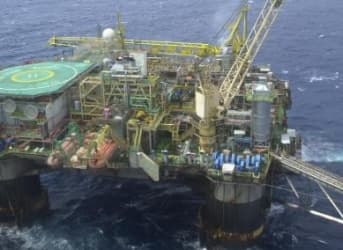Brazil’s incumbent President Dilma Rousseff pulled off a victory on Oct. 26 in a runoff election, and the markets are not too happy about it.
As recently as September, President Rousseff was not seen as the preferred candidate. Brazil’s stock market seesawed as the polls changed, declining when Rousseff gained ground and rising when it appeared that she was falling behind.
In the end, Brazilian voters reelected her for four more years, and the day after the vote, Ibovespa – a leading index of about 50 Brazilian stocks – dropped nearly five percent.
The reason is that investors think that the fiscal policies of her Workers’ Party – largely credited with lifting millions out of poverty – could contribute to rising debt and inflation. There is speculation that Brazil’s credit rating could be downgraded to “junk” status if her administration continues on its present path.
Related: South America: The World's Next Unconventional Frontier?
Take the semi-state-owned oil company Petrobras. Last week, Moody’s Investor’s Service downgraded Petrobras’ credit to Baa2 with a negative outlook. That is just two levels above “speculative” territory.
Despite its offshore oil drilling prowess, Petrobras is deeply indebted. Much of that can be attributed to the expense of fuel subsidies for millions of people. The government of Dilma Rousseff has decided to heavily subsidize fuel in an effort to fight inflation, forcing Petrobras to pay for the expense. Moody’s cited Petrobras’ $170 billion debt as one major reason for the downgrade. That is enough to make Petrobras the world’s most indebted major oil company.
President Rousseff’s two main rivals – Marina Silva and Aecio Neves – both pledged to roll back fuel subsidies if they were elected. That, among other policies generally seen as less interventionist, had investors hoping either of the candidates would oust Rousseff. An oil industry trade group in Brazil said on the eve of the election that some producers might leave the country due to the poor investment climate.
And when each of the rival candidates appeared to lead at various points in the campaign, Petrobras saw its share price benefit. For example, when a June 6 poll was published, showing a 3 percentage point decline in Rousseff’s support, Petrobras’ share price jumped 8.3 percent. Petrobras’ stock surged in late August and early September when Silva shot to the top of the polls. The oil company’s share price then cratered after Rousseff regained lost ground in September.
But by mid-October, Aecio Neves, seemed to have a good chance at winning the runoff after he came in a surprising second place in the first round of voting. Neves was seen as the business-friendly candidate. Neves not only promised to roll back fuel subsidies, he also said he would auction off offshore blocks, allow more investment from private international oil companies, and ease local content requirements that are blamed for ballooning costs.
Related: Brazil’s Petrobras Ramps Up Production of Pre-Salt Oil
Moreover, he indicated he would consider supporting legislation that removed the requirement that Petrobras take at least a 30 percent stake in all new projects in the pre-salt region – oil located deep beneath a layer of salt in the Atlantic Ocean. The result could have been a dramatic liberalization of Brazil’s energy sector.
Finally, the emergence of a kickback scandal also highlighted the perceived mismanagement and corruption at the oil company. A former Petrobras executive testified that he accepted bribes from construction companies that received contracts. After inflating the costs of contracts, some of the money was directed into the campaign coffers of Rousseff’s Workers’ Party. The scandal threatened to undermine Rousseff’s reelection chances.
However, it was not to be. Rousseff won 51.6 percent of the votes and another four years in power. Much of her support came from millions of poor people around the country who have benefitted from Workers’ Party policies. Many see little downside to fuel subsidies, along with other welfare programs that allow them to eke out a better living.
ADVERTISEMENT
The morning after the election, Petrobras’ share price crumbled by 16 percent.
By Nick Cunningham of Oilprice.com
More Top Reads From Oilprice.com:
- Why Petrobras (PBR) Could Be The World Cup’s Biggest Winner
- Petrobras May Get Political Respite Finally
- Environmentalist Surges Ahead In Brazilian Presidential Polling


















